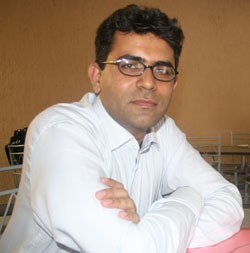
Teerath Mal spent the first five years of his education in anything but a traditional classroom. He went to school in Thana Bola Khan village in Sindh province, southeastern Pakistan, where classes were held outside under a tree. Today, Teerath is 33 and just received his MBA from the Institute of Business Administration, a top Pakistani university housed in a modern campus with manicured gardens and computer labs. Teerath’s path from rural Sindh to an MBA graduate in the bustling port city of Karachi was possible thanks to his hard work and a USAID scholarship.
Teerath is one of 33 rural students from Pakistan to receive tuition and boarding expenses from USAID in partnership with a local microfinance bank. After graduation, students have the option to work for the bank, which provides loans to low-income communities that traditionally have no access to the formal banking sector. Instead, these communities resort to local moneylenders who charge extremely high interest rates that place an enormous financial burden on the loan holders.
During the years he managed his father’s rice processing business, Teerath had no choice but to pay interest rates as high as 120 percent to moneylenders. But after earning his bachelor’s degree, Teerath steered his father’s business toward profitability and put two younger brothers through medical school. When his brothers moved abroad to practice medicine, Teerath knew it was time to focus on his own ambitions. “For seven long years, I forgot about myself and postponed my own dreams,” he said. He applied for an MBA and moved to Karachi, taking his wife and two daughters and his life savings of about $3,300 with him. Planning to work as a math tutor to make ends meet, Teerath landed a USAID scholarship one semester into his two-year degree. Now he plans to accept a finance management job in Karachi before moving back to Sindh, where he will help rural communities get access to market-rate loans. “I want to contribute and give back something to the society I owe so much to,” he said. With Teerath as an example, other students from his village know that, through hard work and dedication, they too can build a bright future for themselves and their families.







Comment
Make a general inquiry or suggest an improvement.